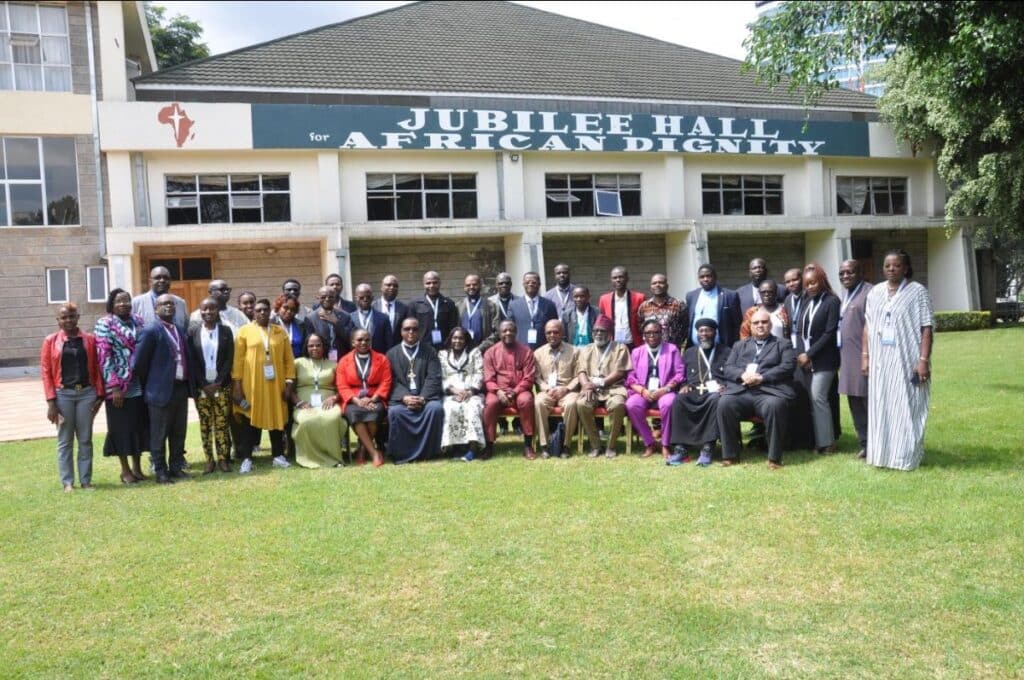Wola Nani, a Caring Response to AIDS
South Africa
|
Donations |
|
To make an online gift to this project click here Select Africa from the designation list and type South Africa – Wola Nani into the Project/Partner line. To make a gift by check to this project click here. |
Wola Nani in the Xhosa language means ‘we embrace and develop one another.’ Wola Nani was established in 1994 as a non-profit entity to help bring relief to the communities hardest hit by the HIV crisis in the great Cape Town area in South Africa. Formed against a background of economic curtailment on welfare spending and a huge increase in the number of HIV and AIDS cases, Wola Nani initiated programs to help HIV positive people in the local community cope with the emotional and financial strains brought about by HIV and AIDS.
South Africa accounts for 10 percent of all global HIV incidences and it is estimated that currently 30 percent of the South African workforce is infected with the virus. Wola Nani brings relief to families and communities hardest hit by the AIDS pandemic and assists them to develop their own strategies to respond to the crisis. Programs focus on the needs of women and children in order to ease the burden of HIV/AIDS on poor families by enabling mothers with HIV to live positively and develop self-help skills. Wola Nani programs fall into three broad categories: Client Support, Education and Awareness, and Skills Development and Income Generation.
Wola Nani’s past success in improving the quality of life for people living with HIV and AIDS has spawned new initiatives that have enhanced the organization’s ability to make a difference. Recently, three programs have been undertaken with successful prospects. The first is the establishment and opening of a non-medical VCT (Voluntary Counseling and Testing) site at Wola Nani center in Gugulethu. The second program is designed to relieve the most vulnerable victims of the epidemic, the children. Wola Nani’s Vulnerable Child Program addresses the needs of those infected and affected by HIV and AIDS with the goal of moving them “from vulnerability to resilience.” Lastly, in 2003 the South African government announced that it would provide antiretroviral (ARV) drugs for the treatment of AIDS to all who needed it. As a result Wola Nani developed a collaborative project to publish a booklet that helps counselors and caregivers understand how to administer the ARV treatment properly and effectively.
The unveiling of the non-medical Voluntary Counseling and Testing (VCT) site in Gugulethu added to Wola Nani’s 2007 focus of “know your status”. Its opening demonstrated the trust and confidence that the City of Cape Town and the Provincial Health Department hold for the Wola Nani organization. The site provides convenient diagnostic AIDS testing as well as pre and post-test counseling. Clients who test positive are instructed in how to lead healthy and productive lives and those who test negative are counseled in preventative measures in order to sustain their HIV/AIDS free status. Since the VGT began operating in December of 2006, the number of persons coming forward to be tested has increased from 16 per month to 117, an increase of over 600% in just six months. Projections call for the site to be conducting over 450 tests monthly before the end of 2007.
The Vulnerable Child Program is a combination of testing and education. Instituted in 1994, the program has deteriorated over the last few years for various reasons. However, in December of 2006 the program was rejuvenated with funding allocated by one of South Africa’s national banks, ABSA, and the Levi Strauss Foundation, two long-standing donors to Wola Nani. A program specifically designed to focus on children is critical because the effects of HIV and AIDS leave them especially defenseless. There are high rates of vertical transmission from mother to child. Premature death of one or both parents is not uncommon. Children rooted in an HIV and AIDS household are at extreme risk for emotional stress, psychological deprivation, and assaults upon their personal health. Wola Nani aims to fill these gaps and counsel those who have succumbed to some of the emotional trauma and ailments that HIV and AIDS can trigger.
Children under 14 are deemed most at risk and are the primary focus of the Vulnerable Child Program. Four days a week at each center, a child program coordinator and program volunteers engage participating children. Activities center on an introduction to health and self through drama presentations. Each child’s health is monitored and recorded and if necessary, referred to an appropriate health facility. Through the creation of a positive and interactive environment, the children learn to trust the support group and become active and committed participants. They are also engaged in active play and education where they receive and retain information on healthy lifestyles such as how to properly wash their hands and brush their teeth. The children are provided nutritious food twice a week and each child receives on-going monitoring to assess progress and development. The Vulnerable Child Program also maintains a home visit component to orphaned children. Based upon the level of participation, it appears that the program is continuing to gain popularity and success at all the centers.
With the government’s 2003 announcement to provide antiretroviral (ARV) drugs for public treatment of AIDS to all who need it, Wola Nani developed a collaborative project and published a booklet on administering proper ARV treatment. “Antiretroviral Treatment Literacy for Caregivers of Children on Treatment: A Counselor’s Guide” has been met with great success. The booklet is published in both English and Xhosa and is presented in an easy to use format that allows ARV counselors to provide specific objectives and information. Response to the booklet has been very positive and has generated requests from other organizations including the provincial Health Department, who want to use the publication as part of their respective training courses.
The heart of Wola Nani’s income generating activities is the making and marketing of unique crafts and gifts. At present, the program supports anywhere from 35 to 60 women with the objective being to continually expand the number of clients served. Women employed in craft-making are able to earn a regular and sustainable income. Thus, they can afford to feed their families and send their children to school, giving them feelings of pride and accomplishment despite their HIV positive status. Crafts include beaded ribbons, bracelets and napkin rings, papier mache bowls, picture frames, light bulbs, tea lights, and cards. Items are sold via mail-order catalogue and through retail shops regionally and worldwide.
Fresh marketing techniques, innovative and unique crafts, and the expansion of national and global distribution are all factors that will facilitate sustained growth in the program and in turn, enable Wola Nani to economically empower its clients and make a greater difference in their lives.
Below are just a few of the many special ways in which your gift can help Wola Nani:
- $25 will buy Home Health kits for five clients
- $50 will enable ten children clients to receive supplemental wholesome meals twice a week for a month
- $200 will provide HIV diagnostic testing procedures for 50 individuals
- $500 can fund the purchase of materials needed by a craft-maker to confection 1,000 papier mache bowls for sale and income-generation
- $2,000 will allow for the training of ten clients to be skilled as certified home caregivers
- $5,000 would mean two part-time HIV counselors could be added to the staff for one year
Read the report from Wola Nani about their 2011 World Aids Day Activities
Support this Ministry
To make a gift for this ministry online or by check use the online donation page.
- 100% of your gift will be directed to Wola Nani, a Caring Response to AIDS
- You will receive updates on the work in this area as they become available
- Share in the vision of God’s abundant life for all people
Related Content
African churches consult on decolonization, reparations
African Church leaders, theologians, and academicians attending a theological consultation on...
Read MoreDear Secretary Rubio: Don’t Close Embassies in Africa
There is a concerning proposal to close several U.S. embassies and consulates in Africa,...
Read MoreGlobal Ministries is Saddened to Learn of the Death of Dr. Gene Johnson
Dr. Gene E. Johnson died April 2, 2025, at age 96 at the Seminary Village, Galesburg, IL. He...
Read More

